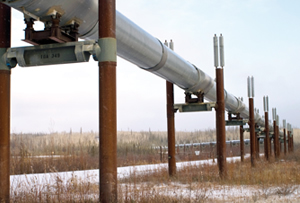Power play
Romania could be set to lose out on massive transit deals for oil and gas supply, in moves which experts argue are motivated by political and not economic interest, writes Ana-Maria Nitoi
 |
|
|||||||||||||
Reducing energy dependency on foreign countries is the distant hope for every European country outside of Russia.
Therefore transit countries that carry oil and gas from far eastern Europe, central Asia and the Middle East are gaining in international significance. Bulgaria, Romania, Greece, Turkey and the Baltic states should be the chief beneficiaries from this passage of energy.
However new Russian deals are by-passing Romania, meaning the country could lose out in its ambition to become a regional energy hub.
“The Kremlin has other priorities than Romania in the Black Sea region and its interests tend to Bulgaria, Greece and Turkey,” says Olga Vorkunova, a senior expert for Russia’s Academy of Science.
Bulgaria and Serbia look poised to benefit from new oil and gas transit routes, while Russia is keeping Romania in the cold. This is similar to a Russian gas deal with Germany, North Stream, which does not cross Polish territory. Some analysts argue that Russia makes these choices not for economic reasons, but as punishment to certain ex-Communist states for their pro-western policy approach.
“Russia’s energy strategy towards the EU is meant to divide Old Europe from New Europe,” says Jonathan Eyal, director of the International Security Studies in the London-based Royal United Services Institute for Defence and Security Studies (RUSI).
'1') {
require('php/art_auth.inc');
}
?>
Moscow has used its significant energy resources and its historic relationship with resource-rich countries such as Kazakhstan and Turkmenistan to regain the political influence lost at the end of the Cold War. The EU now imports 30 per cent of its natural gas from Russia. But Moscow has not made this easy. At the end of both 2005 and 2006, the Kremlin flexed its muscles to western Europe by turning off the tap on EU-directed gas pipelines.
“Russia understands how to use its monopoly in energy supply as a political means in promoting its geostrategic priorities,” says Social Democrat Romanian MEP Adrian Severin. “This creates a major insecurity in the EU.”
No alternatives
The EU’s dependence on Russian gas has few alternatives. Nuclear power is one. In France, 80 per cent of its electricity supply is provided by nuclear energy. Romania now covers over 15 per cent of its power using this means and will double this capacity by 2015.
Romania has more energy resources than most EU countries. In 2007, Romania exported 5.3 per cent of the electricity it produced. It has significant deposits of oil and natural gas and imports only a small quantity of gas, compared to other EU members, from Russian gas provider Gazprom.
All Romania’s gas imports, around 40 per cent, come from Gazprom, while most of the ten states that joined the EU in 2004 buy around 75 per cent of their gas from Russia.
Another solution to reduce dependency on Russia is to develop sustainable energy resources, such as hydro-power, wind energy or biomass. Romania has rivers, mountains and forests for such projects and energy multinationals Enel and Iberdrola plan to establish wind farms in Dobrogea, east Romania. But renewable energy needs money and patience. This is only one card in the flush of production means needed to establish an energy-independent state.
Nabucco: uncertain future
Another alternative for the EU is to find alternative gas providers such as oil and gas rich Iran and the former Soviet states, Azerbaidjan, Kazakhstan and Turkmenistan. These countries do not have the infrastructure to carry the resources to the heart of the EU.
The pipeline project Nabucco could transport gas from these countries through Georgia, Turkey, Bulgaria, Romania and Hungary, ending up in the gas hub of Austria. The five billion Euro construction, for which Romania pays 800 million Euro, was supposed to start next year and finish in 2015, but the states involved have not made any final agreements.
Among the energy companies, Turkey’s Botas, Bulgaria’s Bulgargaz, Romania’s Transgaz, Hungary’s MOL, Austria’s OMV and Germany’s RWE have signed agreements to build the pipeline.
Romania is the loudest supporter of this project, which has backing from Brussels and the USA. The 3,300 km pipeline is the only project by-passing Russia. Alas, the most politically disadvantageous option for Russia is the one for which Romania reaps the most benefit.
Blue Stream II: Serbian-favoured
Russia has developed other projects for pipelines to compete with Nabucco. There is a continuation of the Blue Stream gas pipeline, which connects Russia to Turkey under the Black Sea.
The Blue Stream II could run through Greece and Bulgaria to Serbia, Croatia and Hungary. This was revived in 2006, after an agreement was signed between Serbian state gas company Srbijagas and Gazprom to build a gas pipeline in Serbia.
Later Gazprom bought the majority share in state-owned Serbian oil and gas company NIS and agreed to make Serbia part of Nabucco’s main competitor, gas pipeline project South Stream, which runs from Russia to Bulgaria under the Black Sea.
In 2007, a powerful blow to Nabucco came from Hungary, which announced its participation in Gazprom’s Blue Stream II project. Hungarian Prime Minister Ferenc Gyurcsany has not rejected the participation in the Nabucco project, but a small country like Hungary may have major difficulties funding two major gas pipeline projects.
Austria: the Russian connection
In the meantime, Gazprom has bought half the shares in Austrian energy giant OMV’s gas hub at Baumgarten, Austria. A third of Russian gas exports to western Europe transits this hub, which is also the terminus of the proposed Nabucco project. Baumgarten is one of the busiest energy transit points in Europe and aims to become its main trading post for the international gas market. If Nabucco goes ahead, it could find itself by-passing Russian territory, but ending up in a Russian-friendly terminus in Austria.
The agreement between OMV and Gazprom will give Russia’s state-owned gas company influence in administrating gas pipelines that transit central Europe. The largest quantity of Russian gas to west Europe travels through gas pipelines in Slovakia and Ukraine, which terminate in Baumgarten. From here, the gas goes to Italy, Germany, Switzerland and Hungary.
South Stream: chances high
Earlier this year Russian President Vladimir Putin paid a visit to Bulgarian counterpart Gheorghi Parvanov to sign three energy deals. Putin incorporated Bulgaria into the ten billion Euro South Stream project. This will link Russia to the Bulgarian refinery in Burgas through a 900 kilometre pipeline under the Black Sea, to be constructed by Gazprom and Italian energy firm ENI.
From Bulgaria the gas will fork off south to Greece and Italy and north to Serbia, Croatia, Hungary and, probably, Baumgarten in Austria. In a speech last January, Parvanov said that Bulgaria has always “suffered” from its strategic location, and the time has come to reap the benefits. The European Commission did not react negatively to South Stream. Instead it made neutral comments saying that “energy security in terms of supply” depends not only on finding new suppliers, but also on diversifying new gas transport routes.
This was another blow to Nabucco and a slap in the face to Romania. South Stream is also Russia’s alternative to supplying Europe without transiting Ukraine, a nation with which the Kremlin has a complicated relationship. But this project, like Blue Stream II, seems to punish Romania’s strong position for Nabucco.
“Russia will not let the Nabucco project materialise,” says Russian energy expert Olga Vorkunova. Other experts believe the project is quixotic.
“Nabucco is an unsuccessful, non-reachable geopolitical project of the EU,” adds Manja Vidic, energy and risk analyst for Slovenian Institute for Strategic Studies.
EU: divided over energy
Romania’s politicians want the EU to speak with a single voice on diversifying the EU’s energy supply and ending dependency on Russian gas. They believe this is only possible with the Nabucco project. But a unified EU position is impossible due to the bilateral agreements between different European member states and Gazprom.
“Energy security is part of a country’s national security and every country will first think in its own interests and then in the interest of a club of which it is a member,” says Liviu Muresan, president of Romanian security think tank, the Eurisc Foundation.
One example is Berlin, which has agreed to build the North Stream pipeline project to bring Russian gas from Saint Petersburg under the Baltic Sea to Germany, where it will probably continue to Holland and the UK. This will also be built underwater, increasing the construction costs by three times compared to a ground-based pipeline and endangering the ecosystem of the Baltic Sea. Multinationals BASF, Gasunie and E-ON are partners in this deal, which will boost EU dependency on Russian gas from 30 to 40 per cent. This pipeline ignores Poland and the Baltic states, which, like Romania and Ukraine, are not in favour at the court of Putin.
“What is the purpose of building North Stream under the sea when it could very easily be built through the Baltic states, Poland, to Germany, if not to exclude the countries from central Europe from having access to the pipeline?” says Jonathan Eyal.
Ukraine has its own alternative to South Stream, the White Stream pipeline. This has been a long-fostered project of Ukrainian Prime Minister Iulia Timoshenko to bring gas from Central Asia under the Black Sea from Georgia to Ukraine and onto the EU.
Experts argue that White Stream has the fewest chances of realisation, Nabucco looks to be on indefinite hold, while a quiet has descended for a year over Blue Stream II. The South and North Stream pipelines have the greatest chances of realisation. These are the two which benefit west Europe and Russia to the detriment of east European countries out of favour with Russia.
Kazakhstan: crucial oil link
Nabucco is not yet viable because the parties involved have not decided the most important aspect of the project: where the gas resources will come from. There is no supplier. Iran, Azerbaidjan, Kazakhstan, Turkmenistan and even Iraq are possible contenders - but nothing is established.
From these countries, Romania has a good relationship with Kazakhstan, which has the largest oil and gas deposits in Central Asia. This is due to Kazakhstan’s energy company KazMunaiGaz’s purchase in 2007 of Romania’s private oil and gas group Rompetrol. Kazakh President Nursultan Nazarbaev has discussed with President Basescu how the two countries can co-operate in the Constanta-Trieste ‘dream’ pipeline aiming to bring oil from Central Asia to Constanta harbour, then onto Serbia, Croatia and Slovenia before terminating at the Italian port Trieste.
KazMunaiGaz’s ownership of Rompetrol allows the central Asian company to distribute its oil in the company’s petrol stations in Romania, Georgia, the Republic of Moldova, Albania and France. Azerbaidjan’s state owned oil company Socar has also shown interest in the Constanta-Trieste project. Socar recently bought an oil hub at Kulevi in Georgia and has now a direct railway to transport the oil closer to the EU.
However Putin’s recent visit to Sofia sealed another agreement concerning the proposed Burgas-Alexandroupolis oil pipeline, the main competitor to Constanta-Trieste. This 285-km pipeline will transport oil from Bulgarian port Burgas, site of Russian Lukoil’s Neftochim refinery, to Alexandroupolis, Greece.
Russia has 51 per cent of the shares in the project and Greece and Bulgaria have 24.5 per cent each. Construction is due to start this year and aims to transport oil from the Kashagan oilfield in Kazakhstan by 2010.
“Romania is not the happiest state in terms of energy security,” says Muresan. Part of the problem, he adds, is that Romania bet everything on the west, such as selling its state oil and gas group Petrom to OMV in 2004. “Now we can see important Russian interests in Austria and this is something that isn’t to Romania’s advantage,” says Muresan.
Russia needs friends too
However Russia needs to keep in favour with the EU because the bloc accounts for 64 per cent of Russia’s gas exporting income. Most of this gas does not come from Russia’s own deposits, but from states such as Kazakhstan and Turkmenistan, which it buys and then sells at a higher price to Europe. This creates a relationship of inter-dependency between Russia and Europe. What would help Russian influence in the future would be if its multinationals, such as Gazprom, could buy up a few European energy companies.
But Romania’s hope that Europe can form a common energy strategy to make deals with Russia on gas supply will not happen in the short term. This is because of the varying needs of countries in the 27 member-bloc. While Germany depends heavily on Russian gas, the UK and France, which have diversified energy resources, rely less on the relationship and some ex-Communist countries buy all their gas from Gazprom.
“For now the EU is in a general confusion,” says RUSI’s Jonathan Eyal. “I don’t see a consensus very soon.”

















